Femia > Health Library > Getting Pregnant > Planning pregnancy > Enhancing fertility naturally: A guide to fertility supplements and foods for women
Enhancing fertility naturally: A guide to fertility supplements and foods for women
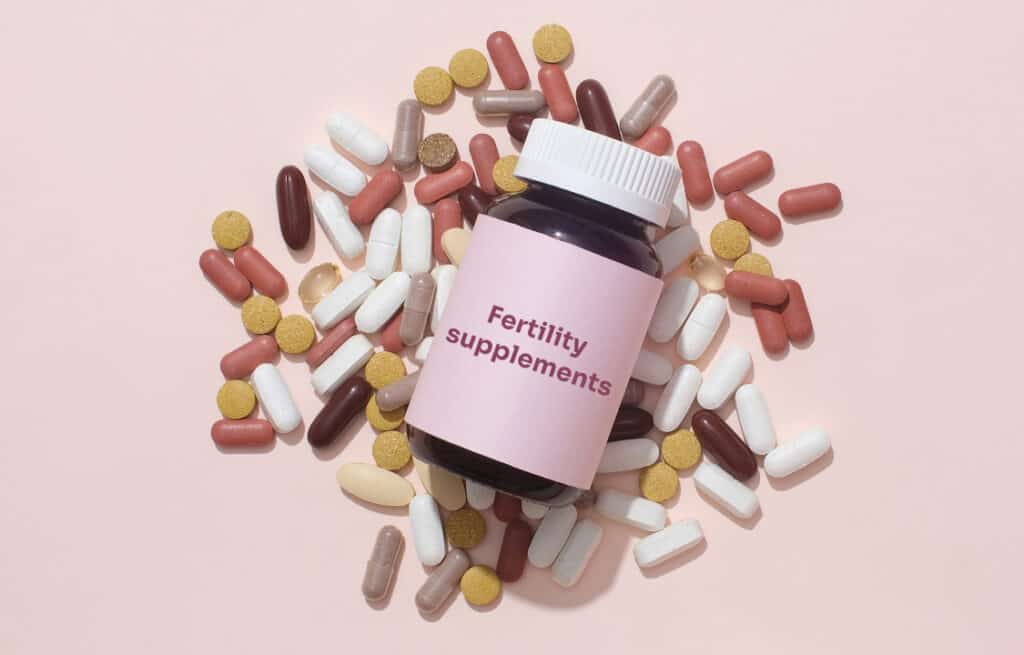
- Updated Feb 11, 2025
- Published
CRAFTED BY HUMAN
Crafted by human At Femia, we provide accurate and up-to-date information at every stage of your journey, from trying to conceive, pregnancy and postnatal support. All content is created by a real person based on in-depth research and own professional experience. Femia ensures that you will receive expert advice, strict accuracy and a personalized approach from our authors/medical experts. Learn more about our editorial policy.
FACT CHECKED
Fact checked At Femia Health, we maintain the highest standards of editorial excellence in delivering content focused on helping you conceive, guiding you through pregnancy, and supporting you postpartum. Explore our content review principles to learn how we ensure the accuracy and quality of our health and lifestyle tips for every stage of your journey.
Several fertility supplements may encourage good reproductive health and boost your chances of getting pregnant. You should consult your doctor to determine which supplements are right for you. Not all supplements are alike, so check the dosage for crucial vitamins to ensure you’re getting enough.
Many couples implement lifestyle changes before conception—not only to ensure they are in good health before becoming parents, but to boost their chances of conceiving in the first place. Improving diet, getting more frequent exercise, reducing stress, and taking supplements are all common ways of boosting one’s health. In addition, there are specific fertility supplements that you can take to support your reproductive health and improve your chances of conceiving.
It’s important to consult your healthcare provider before starting any new supplements. Your doctor can recommend supplements and help you avoid ones that aren’t worth your money.
Fertility supplements and their impact
Fertility supplements contain vitamins and minerals that can boost reproductive health and improve your chances of getting pregnant.
👉 Find out more: Thinking about conception? Genetic testing before pregnancy explained
It’s best to take supplements for individual fertility-boosting vitamins and minerals thought rather than an all-in-one fertility supplement, as these often contain extra ingredients unnecessary for conception.
Before starting any supplements, it’s important to ask your doctor for a blood test to check your current levels of essential vitamins and minerals. Not only will this ensure you take the right supplements; it will also make sure you take the right dosage.
Femia helped 35,000+ couples to optimize their fertility
Benefits of fertility supplements for women
Fertility supplements can support a woman’s body in preparing for conception and maintaining health throughout pregnancy. Here are some structured benefits:
Boosts egg quality: Fertility supplements often contain antioxidants and other nutrients that enhance egg quality, increasing the chances of successful conception.
Regulates hormones: Many fertility supplements include ingredients that help balance hormone levels, which is essential for a regular menstrual cycle and optimal fertility.
Supports reproductive health: Preconception supplements provide vital nutrients that nurture reproductive organs and overall health, creating a more conducive environment for conception.
Comprehensive nutritional support: All-in-one fertility supplements combine a variety of vitamins and minerals, offering a balanced mix designed specifically for reproductive health needs.
When choosing an all-in-one fertility supplement, consider the following:
Research ingredients: Look up each ingredient to understand its fertility benefits and ensure it meets recommended dietary allowances (RDA).
Check Dosages: Verify that the supplement includes adequate amounts of essential nutrients for optimal fertility support.
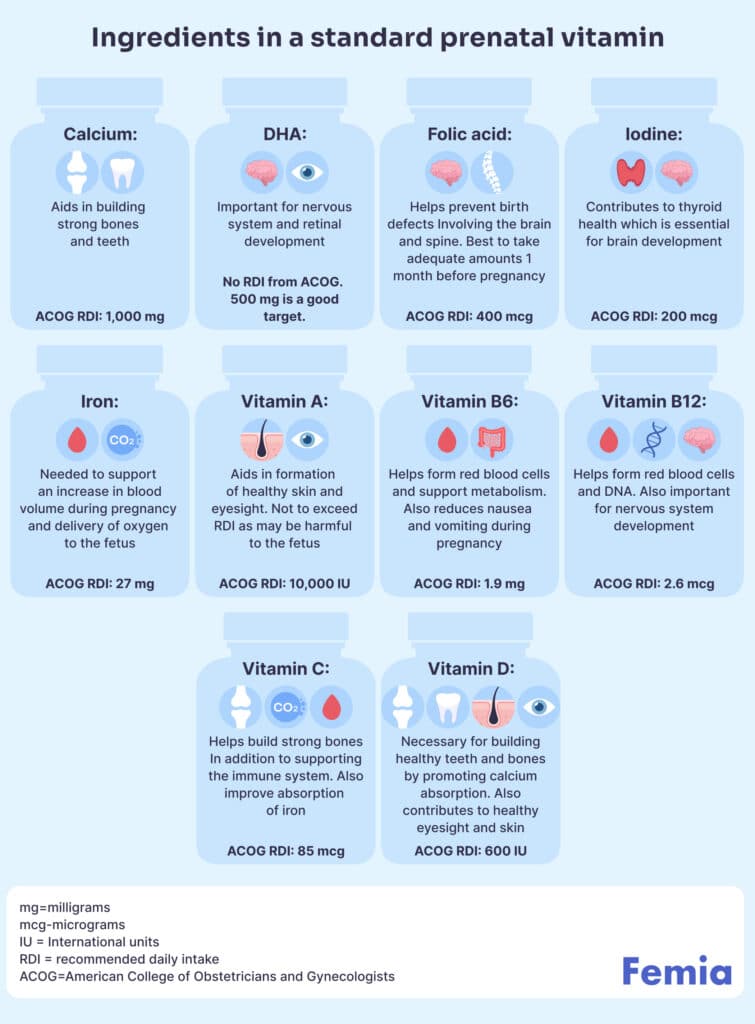
Essential fertility supplements and their benefits
Coenzyme Q10 (CoQ10)
CoQ10 is an antioxidant in the body and can protect cells from damage. CoQ10 can protect cells from damage. A 2018 study published in Reproductive Biology & Endocrinology found that CoQ10 supplementation was associated with higher egg retrieval rates, better fertilization rates, and a higher number of high-quality embryos in young women with poor ovarian reserves.
Additionally, a 2019 study published in Free Radical Biology & Medicine found that CoQ10 supplementation can prevent postovulatory aging and preserve egg quality, which may improve in-vitro fertilization (IVF) success rates. It is present in foods such as fist, tofu, and nuts.
Omega-3 fatty acids
Omega-3 fatty acids reduce inflammation in the body and boost overall health. Their anti-inflammatory properties may also help balance the hormones necessary for conception. A 2022 study published in Human Reproduction found that omega-3 fatty acid supplementation may increase the chance of conception.
Vitamin D
Vitamin D is an essential vitamin that most people get from spending time outdoors in the sun. If you live in the northern hemisphere or spend a limited amount of time in the sun, you may not be getting enough of this essential vitamin. According to a 2022 study published in Nutrients, vitamin D improves fertility in healthy women and those diagnosed with Polycystic Ovary Syndrome (PCOS).
Iron
Iron deficiency can impact fertility, so ensuring adequate iron levels is essential when trying to conceive. A 2023 study published in Frontiers in Endocrinology found lower iron levels amongst women struggling with infertility.
Folic acid
You may be aware that pregnant women should take folic acid supplements during pregnancy, but did you know that you should start taking this supplement before you are pregnant?
Start before pregnancy: It’s recommended to begin taking folic acid supplements before conception to prepare your body for the early stages of pregnancy.
Supports neural tube development: Folic acid is essential for forming the neural tube, which includes the brain and spinal cord. This development occurs very early in pregnancy, often before many women know they are pregnant.
Reduces risk of neural tube defects: Taking 400-800 mcg of folic acid daily helps reduce the risk of neural tube defects, as recommended by health organizations.
May benefit ovarian reserve: A 2022 study suggests that folic acid could support ovarian reserves, though more research is needed on its specific effects on fertility.
Essential for early pregnancy development: To support early fetal development, it’s vital to maintain adequate folic acid intake while trying to conceive and throughout the first trimester.
Selenium
Selenium is an essential mineral that supports fertility by acting as a powerful antioxidant, protecting reproductive cells from oxidative damage. This mineral is particularly important for maintaining healthy ovarian follicles and promoting egg quality. Studies have shown that adequate selenium levels may also help regulate thyroid function, which plays a key role in hormone balance and reproductive health. Recommended intake: 55 mcg daily for adults.
Myoinositol
Myoinositol is a naturally occurring compound that helps balance hormones and improve insulin sensitivity, particularly beneficial for women with PCOS. Studies suggest that myoinositol may help regulate menstrual cycles, improve egg quality, and promote a favorable hormonal environment for conception. It is often paired with D-chiro-inositol to enhance effectiveness in managing PCOS symptoms and supporting ovulation. Recommended dosage: 2-4 grams daily, depending on individual needs.
Vitamins B6 and B12
Vitamins B6 and B12 play essential roles in supporting hormone regulation, reducing inflammation, and aiding the body’s energy production—all crucial factors for reproductive health. Vitamin B6 helps balance progesterone levels, while B12 supports healthy blood and nerve function, both of which are vital during early pregnancy. These vitamins also work together to reduce the risk of neural tube defects in the baby, making them essential nutrients for preconception health. Recommended daily intake: 1.5 mg for B6 and 2.4 mcg for B12.
L-carnitine
L-carnitine is an amino acid that supports energy production within cells and may help improve egg and sperm quality. It is known for its ability to reduce oxidative stress, supporting the overall health of reproductive cells. Research suggests that L-carnitine supplementation may enhance fertility by improving cellular energy levels, making it beneficial for both men and women. Suggested dosage: 500-2000 mg daily, depending on individual needs.
L-arginine
L-arginine is an amino acid that supports blood flow to reproductive organs, which can improve egg health and uterine lining quality. This increased blood flow may create a healthier environment for implantation and support early pregnancy. L-arginine has also been shown to aid in overall fertility and help with hormone regulation, particularly in cases of PCOS. Recommended daily dosage: 3-6 grams for fertility support.
Natural fertility supplements
In addition to supplements that boost targeted vitamins and minerals, there are also natural fertility supplements from herbs and plants that may aid fertility, such as:
Chasteberry
Chasteberry (Vitex) aids in maintaining healthy hormonal function and boosting reproductive health. However, according to a 2022 study published in F & S Reports, chasteberry may be unsafe during pregnancy, so it’s essential to check with your doctor before taking this supplement.
Evening primrose oil
Evening primrose oil contains omega-6 fatty acids. Some believe it can improve cervical mucus and help sperm reach the egg; however, there isn’t much science to back up this claim. Evening primrose oil can have side effects, so you must speak with your doctor before trying this supplement.
Maca root
Maca root is often touted as a must-have fertility aid, but the science is mixed. A 2018 review in the Journal of Ethnopharmacology found limited science to back up the claims that maca root can boost fertility.
Fertility foods for women
The best fertility diet is a healthy, balanced one. You want to ensure you get a good mix of vitamins and minerals from your food, so your body has everything it needs for conception. Be sure to include the following foods in your diet:
- Leafy greens (e.g., spinach, kale). They are rich in folate, iron, and essential vitamins.
- Berries (e.g., blueberries, strawberries). Berries are packed with antioxidants and essential vitamins. Eat a mix of berries throughout the week.
- Nuts and seeds (e.g., almonds, flaxseeds). These plant-based sources of omega-3 fatty acids are also high in vitamin E.
- Whole grains (e.g., quinoa, brown rice). In addition to providing essential nutrients, whole grains are high in fiber, which is crucial for good health.
Femia helped 35,000+ couples to optimize their fertility
Recommended fertility-boosting meal plan
A fertility-friendly meal plan takes the stress out of mealtimes. Planning your week in advance will ensure that you eat a variety of fresh vegetables and fruits. Be sure to include plenty of healthy oils, fiber-rich foods, and fertility-boosting superfoods.
Example:
Daily supplement: CoQ10 with Omega-3 fatty acids and vitamin D.
Breakfast: Fresh berries, nuts, and seeds served with Greek yogurt.
Snack: Apple slices with peanut butter.
Lunch: Quinoa salad with spinach, roasted butternut squash, mixed salad vegetables, and an olive oil dressing.
Snack: Avocado on wholegrain toast or crackers.
Dinner: Salmon with lentil salad and steamed vegetables.
Eating a mix of healthy foods is good for your health, but it’s also important to avoid unhealthy food choices that might be bad for your fertility. Quit smoking, reduce your alcohol consumption, and limit your intake of processed meats and sugary junk food.
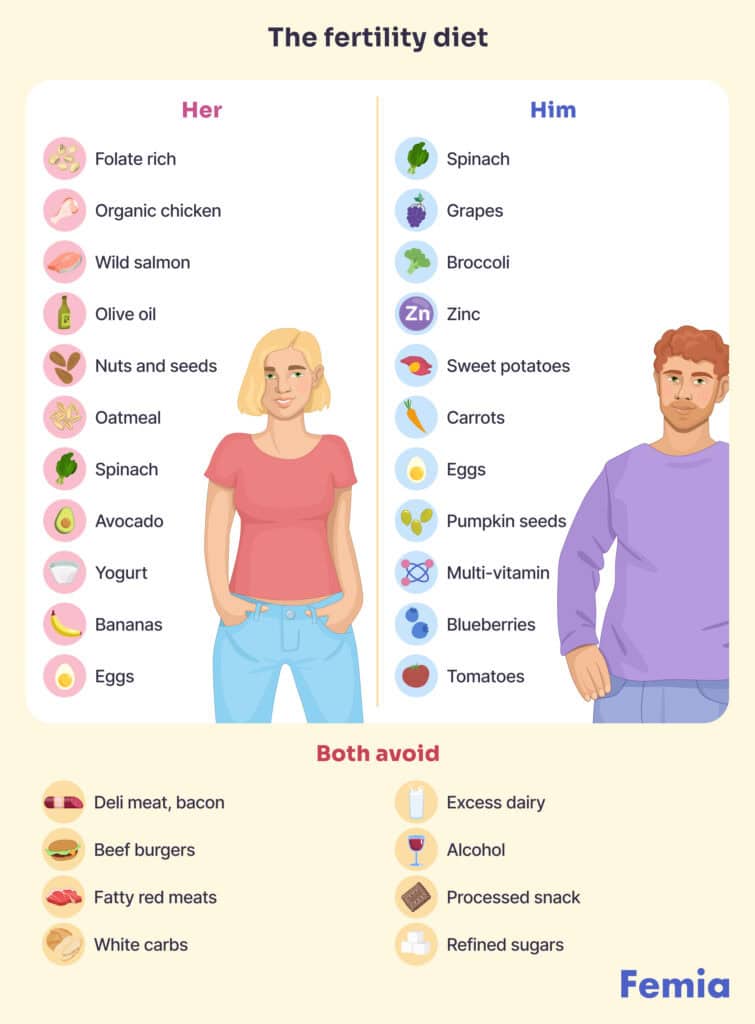
Questions from a Femia community
How do I choose the right fertility supplement for my specific needs?
The first thing to do is speak to your doctor. Your gynecologist or fertility doctor can provide personalized advice. Your doctor is best placed to assess your specific health needs, run any necessary blood tests, and advise you on the best fertility supplements for you.
Can fertility supplements interfere with other medications?
Some supplements interfere with other medications, which is why you must speak to your doctor before starting any new supplements. Fertility supplements can interfere with blood thinners, thyroid medications, and blood pressure medications, so you must talk to your doctor to find out which supplements are safe for you to take.
Are there any side effects of taking fertility supplements?
While most people take supplements without issue, there are some potential side effects you should be aware of when starting a new supplement regime. Nausea, bloating, and diarrhea are all possible side effects; some people may also experience allergic and skin reactions. If you notice any side effects, cease taking the supplement immediately, and speak to your doctor for advice. It may be possible to use a different supplement that won’t cause a reaction.
Can men benefit from fertility supplements as well?
Yes, men can benefit from fertility supplements as well. Preconception supplements can boost semen quality and improve sperm morphology. Speak to your doctor before starting any supplements to ensure you are taking the best ones for you.
• Zinc. Low levels of zinc are associated with poor sperm quality and low testosterone. Zinc supplements can help to boost zinc levels and benefit reproductive health.
• Selenium. Selenium protects sperm from oxidative damage and improves motility.
• CoQ10. Just as it can improve female reproductive health, CoQ10 supplementation could boost male fertility. CoQ10 can improve sperm function.
• Omega-3 fatty acids. The anti-inflammatory qualities of Omega-3 fatty acids are great for reproductive health.
• B12. A 2017 article published in Biomolecules found that B12 was associated with better semen quality.
What is the best time of day to take fertility supplements?
The best time to take fertility supplements generally depends on the type of supplement and your daily routine. For many, taking fertility supplements in the morning with breakfast can improve absorption, especially if the supplements contain fat-soluble vitamins like A, D, E, or K. However, some people prefer to take them with lunch or dinner to avoid any potential stomach upset. Consistency is key, so choose a time that allows you to take them daily without missing doses.
Are there risks of taking multiple fertility supplements together?
Yes, taking multiple fertility supplements together can pose risks, especially if they contain overlapping ingredients, which may lead to excessive intake of certain vitamins or minerals. For instance, too much vitamin A or iron can be harmful, and high doses of some supplements can cause unwanted side effects or interact with other medications. It’s best to consult with a healthcare provider to review your supplement regimen and ensure it’s safe, balanced, and tailored to your specific fertility needs.
The bottom line
Fertility supplements can play a role in boosting fertility and ensuring good reproductive health. To focus your efforts on the right supplements for your baby, you should ask your doctor for a blood test to identify any deficiencies. While multivitamin fertility supplements may promise the earth, it’s essential to do your homework before parting with your hard-earned cash.
Speak to your doctor for advice about which supplements are worth taking. Your doctor is best placed to advise which supplements can boost your fertility and improve your chances of conception.
Speak to your doctor for advice about which supplements are worth taking. Your doctor is best placed to advise which supplements can boost your fertility and improve your chances of conception.
References
- Vitagliano, Amerigo et al. “Dietary Supplements for Female Infertility: A Critical Review of Their Composition.” Nutrients vol. 13,10 3552. 11 Oct. 2021, doi:10.3390/nu13103552 https://www.ncbi.nlm.nih.gov/pmc/articles/PMC8541636/.
- Xu, Yangying et al. “Pretreatment with coenzyme Q10 improves ovarian response and embryo quality in low-prognosis young women with decreased ovarian reserve: a randomized controlled trial.” Reproductive biology and endocrinology : RB&E vol. 16,1 29. 27 Mar. 2018, doi:10.1186/s12958-018-0343-0 https://www.ncbi.nlm.nih.gov/pmc/articles/PMC5870379/.
- Zhang, Mianqun et al. “Coenzyme Q10 ameliorates the quality of postovulatory aged oocytes by suppressing DNA damage and apoptosis.” Free radical biology & medicine vol. 143 (2019): 84-94. doi:10.1016/j.freeradbiomed.2019.08.002 https://pubmed.ncbi.nlm.nih.gov/31398498/.
- Stanhiser, J et al. “Omega-3 fatty acid supplementation and fecundability.” Human reproduction (Oxford, England) vol. 37,5 (2022): 1037-1046. doi:10.1093/humrep/deac027 https://www.ncbi.nlm.nih.gov/pmc/articles/PMC9308390/.
- Várbíró, Szabolcs et al. “Effects of Vitamin D on Fertility, Pregnancy and Polycystic Ovary Syndrome-A Review.” Nutrients vol. 14,8 1649. 15 Apr. 2022, doi:10.3390/nu14081649 https://www.ncbi.nlm.nih.gov/pmc/articles/PMC9029121/.
- Holzer, Iris et al. “Iron status in women with infertility and controls: a case-control study.” Frontiers in endocrinology vol. 14 1173100. 8 Jun. 2023, doi:10.3389/fendo.2023.1173100 https://www.ncbi.nlm.nih.gov/pmc/articles/PMC10285297/.
- About Neural Tube Defects (NTDs) (2024) National Institute of Health https://www.nichd.nih.gov/health/topics/ntds/conditioninfo#:~:text=An%20NTD%20occurs%20when%20this,knows%20that%20she%20is%20pregnant. (Accessed 9 July 2024).
- Kadir, Mumta et al. “Folate intake and ovarian reserve among women attending a fertility center.” Fertility and sterility vol. 117,1 (2022): 171-180. doi:10.1016/j.fertnstert.2021.09.037 https://www.ncbi.nlm.nih.gov/pmc/articles/PMC8714696/.
- Friedman, Julie et al. “Herbal supplement use among reproductive-aged women in an academic infertility practice.” F&S reports vol. 4,1 104-111. 17 Dec. 2022, doi:10.1016/j.xfre.2022.12.001 https://pubmed.ncbi.nlm.nih.gov/36959959/.
- Beharry, Shruti, and Michael Heinrich. “Is the hype around the reproductive health claims of maca (Lepidium meyenii Walp.) justified?.” Journal of ethnopharmacology vol. 211 (2018): 126-170. doi:10.1016/j.jep.2017.08.003 https://pubmed.ncbi.nlm.nih.gov/28811221/.
Banihani, Saleem Ali. “Vitamin B12 and Semen Quality.” Biomolecules vol. 7,2 42. 9 Jun. 2017, doi:10.3390/biom7020042 https://www.ncbi.nlm.nih.gov/pmc/articles/PMC5485731/.
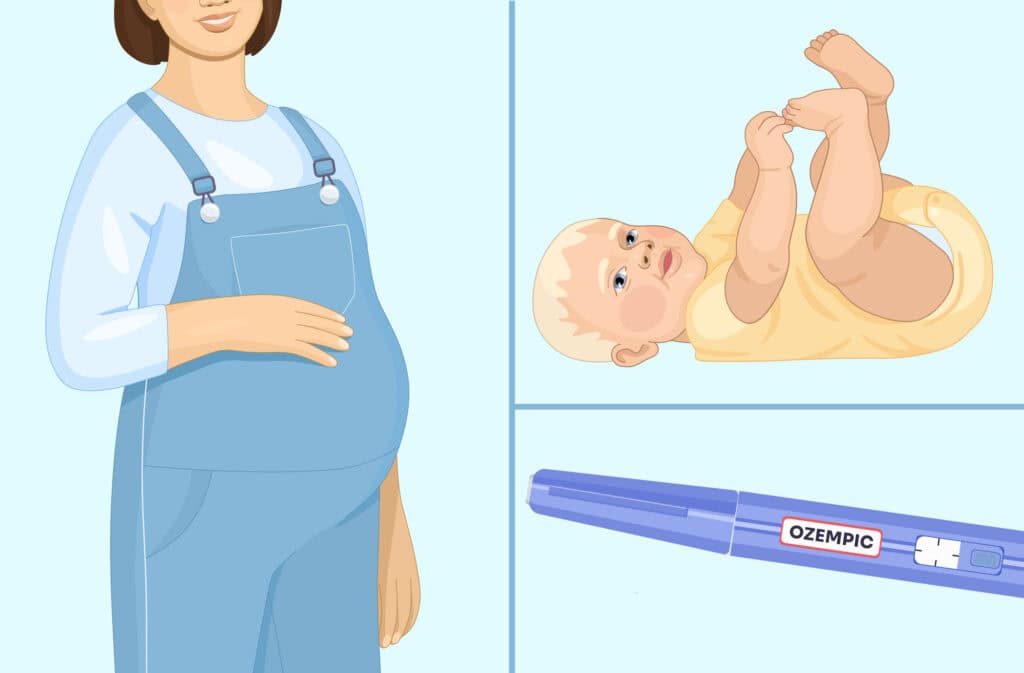
Discover how Ozempic affects fertility and pregnancy. Learn about ‘Ozempic babies’, potential risks, and alternatives for managing weight while trying to conceive.
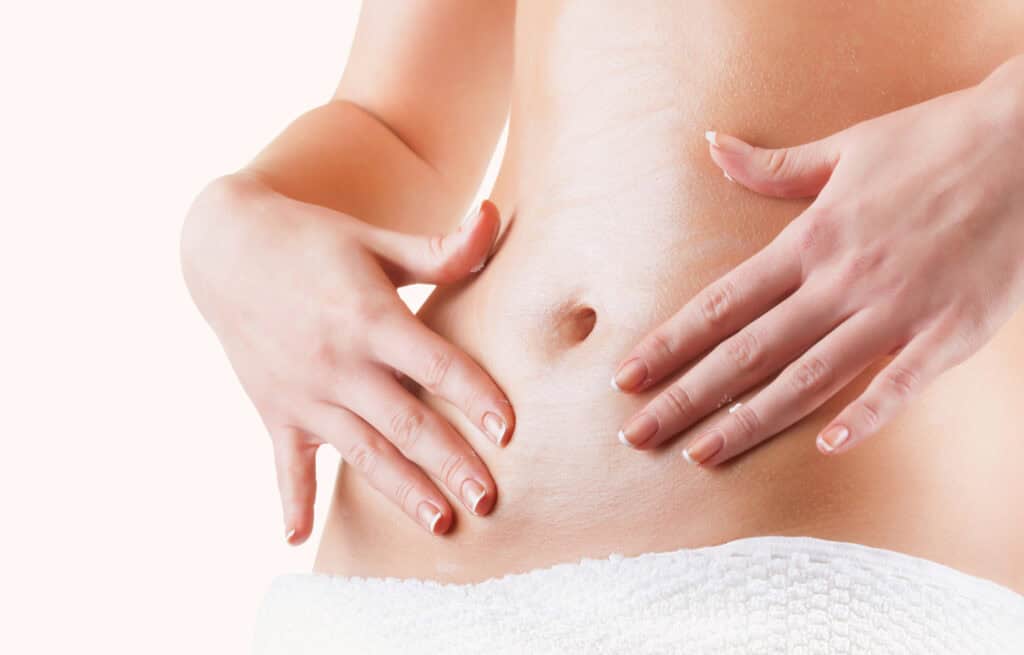
Complete guide to pelvic floor massage: Learn effective techniques, the benefits for pain relief and improved function, and tips to enhance your pelvic health.
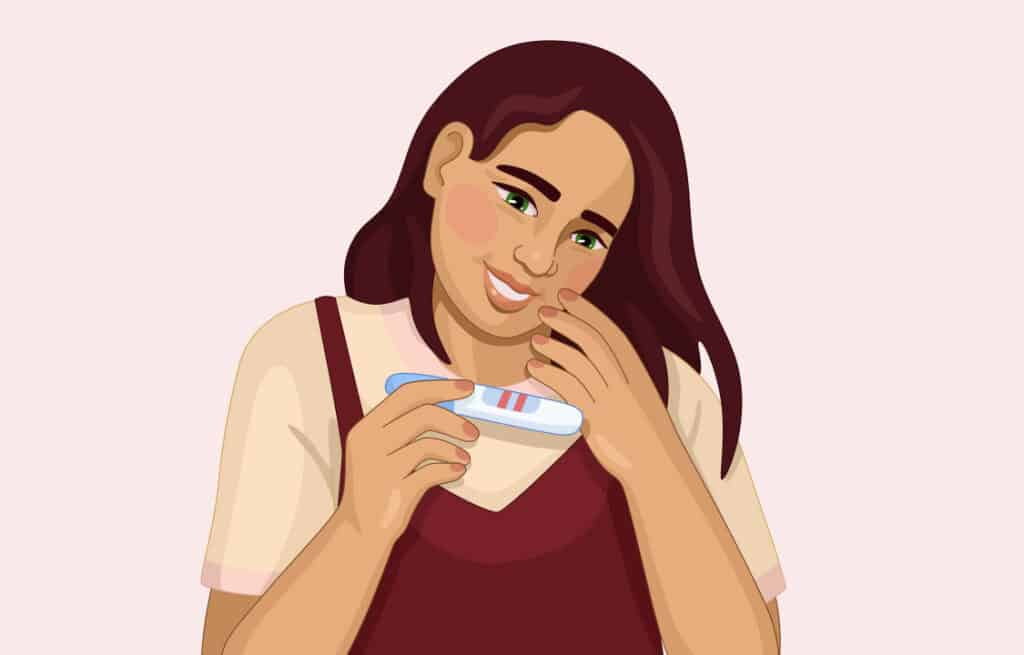
Discover key signs your body is ready for pregnancy. Learn how to know if you’re fertile enough to get pregnant: physical indicators, medical tests, etc. Expert advice from Femia.

